Jared Golden ’11 and Ben Cline ’94 actually have a lot in common. As undergraduates, both felt a bit different from their peers — Golden was older and a Marine veteran, while Cline was a conservative from the South.
Both majored in politics (Golden also majored in history), and both worked on Capitol Hill before being elected to the legislatures of their home states.
Now, they’re both first-term Congressmen from largely rural districts, Golden representing Maine’s sprawling 2nd District, the largest east of the Mississippi River, and Cline serving Virginia’s 6th District, in the northwest part of that state.
For all that’s similar about the pair, one key difference — Golden being a Democrat, and Cline a Republican — made their Reunion appearance in June a must-see.
+The nine Bates alumni who've served in Congress
Including Ben Cline ’94 and Jared Golden ’11, nine Bates alumni have served in the House of Representatives. (One alumnus, Ed Muskie ’36, has served in the Senate.)
Their election marks the second time two alumni have served in Congress at the same time (the first being 1933–35, when Carroll Beedy and Donald Partridge, both Republicans, represented Maine’s 1st and 2nd districts), and the first time representing both major parties. The nine:
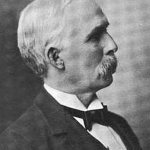 John P. Swasey, who attended the Maine State Seminary prior to the Civil War, served in Congress from 1908 to 1911.
John P. Swasey, who attended the Maine State Seminary prior to the Civil War, served in Congress from 1908 to 1911.
- John P. Swasey, R-Maine, who attended the Maine State Seminary, fought in the Civil War, and then earned a bachelor’s degree at Tufts
- Daniel McGillicuddy, D-Maine, Class of 1881 (transferred to Bowdoin after three years)
- Carroll Beedy, R-Maine, Class of 1903
- Charles Clason, R-Mass., Class of 1911
- Donald Partridge, R-Maine, Class of 1914
- Frank Coffin, D-Maine, Class of 1940
- Bob Goodlatte, R-Va., Class of 1974
- Ben Cline ’94, R-Va., Class of 1994
- Jared Golden ’11, D-Maine, Class of 2011
In a Pettengill Hall classroom packed with Reunion attendees, the pair covered a range of topics — at times sounding almost confessional in their frustration with the hyperpartisanship in Washington.
Interviewed by professors John Baughman (politics) and Stephanie Kelley-Romano (rhetoric, film, and screen studies), the two talked about their Bates pasts, about what it was like arriving in Washington during a government shutdown, and how the alignment of powerful — and surprising — forces tends to stymie bipartisanship.
On their first days in Congress — during a government shutdown
When Golden and Cline were sworn in in early January, the federal government was in the middle of a five-week partial government shutdown. There was barely time to get acclimated to the offices and technology, Cline said. “We were voting on day one.”
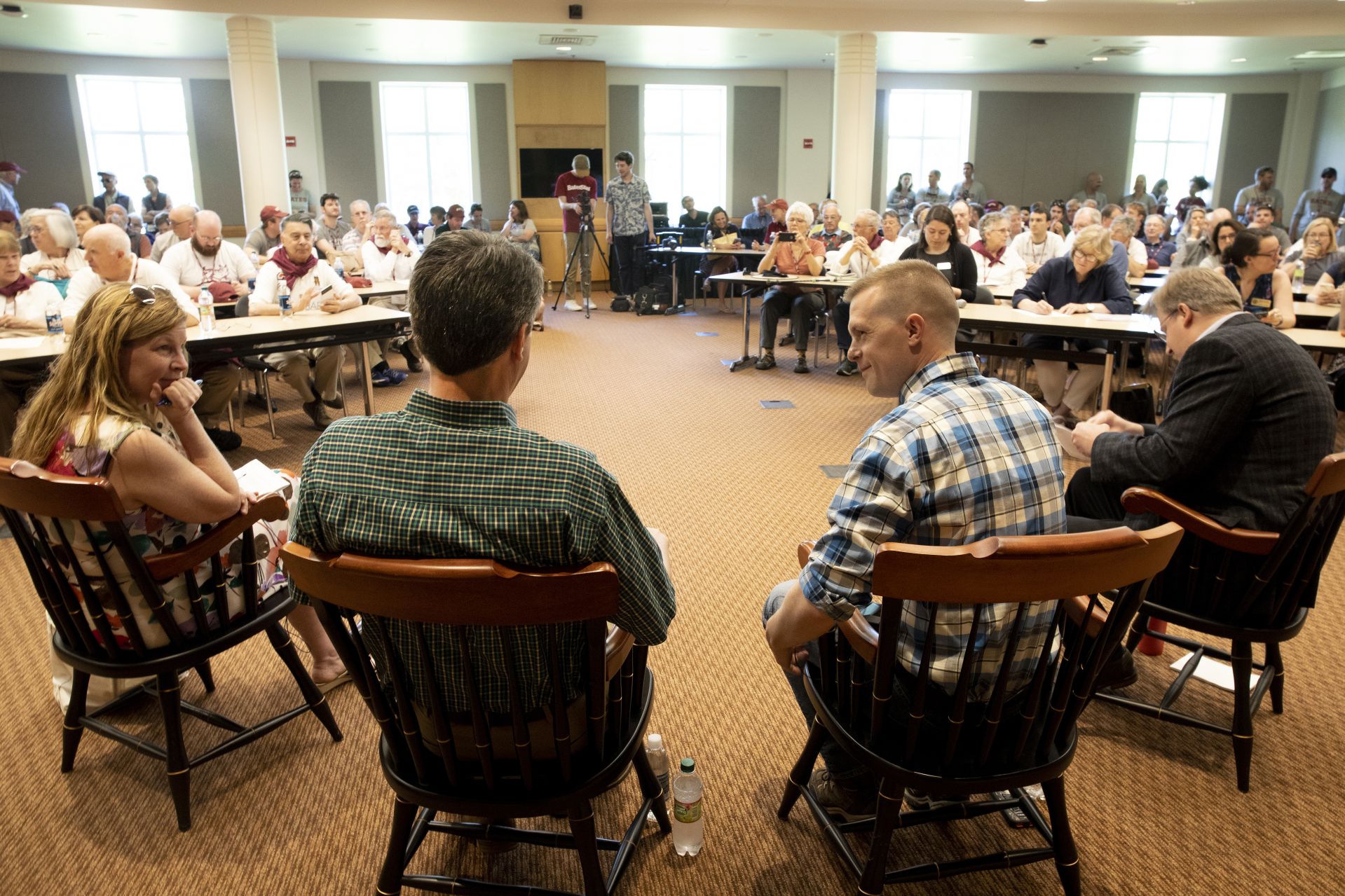
At left and right, moderators Stephanie Kelley-Romano and John Baughman prepare for their discussion with newly elected Congressmen Ben Cline ’94 of Virginia and Jared Golden ’11 of Maine (second from left and right) on June 8 at Reunion. (Phyllis Graber Jensen/Bates College)
The 116th Congress includes a number of charismatic, media-savvy freshman members comfortable in the national spotlight, and both Golden and Cline frequently referenced Alexandria Ocasio-Cortez, D-N.Y., during their discussion, with Golden distancing himself from her style of legislating.
“There’s room in every caucus for all kinds, and you need a little bit of every type of leader,” he explained. “Mine is, I think, a more quiet, dogged focus on issues and work, and then getting to the district and traveling around and meeting people face-to-face and making sure they feel a strong connection to their representative.”
Golden and his staff decided, instead of jumping straight into high-profile issues, to hang back and wait for his committee assignments — but he hit a wrinkle there.
“I think I bring an enlisted perspective into that committee room.”
He had promised during his campaign that he would not vote for Nancy Pelosi, D-Calif., as speaker of the House, saying Congress needed a new generation of leaders. He, along with 14 other members, followed through on their promises, but Pelosi was reelected speaker anyway.
“I’m not gonna lie,” Golden said. Voting against the speaker “doesn’t make it easy to get your top committee assignments.”
One of Golden’s two committee assignments is the Committee on Armed Services, whose 62 members include 20 military veterans. Twelve of those served combat tours, but only Golden served in the enlisted ranks.
“I think I bring an enlisted perspective into that committee room,” he said. “There’s a lot of officers sitting in that room. It’s a different, boots-on-the-ground perspective on Afghanistan and Iraq or other things.”
He’s also on the Committee on Small Business, chairing that committee’s contracting and infrastructure subcommittee.
“That committee’s been a real blessing,” he said. “It’s interesting, and in my experience, the one you might not enjoy as much turns out to be really deeply engaging.”
A lawyer, Cline landed among many other lawyers on the Judiciary Committee, an assignment he credits to the Congressman succeeded in Virginia’s 6th District, Bob Goodlatte ’74, who was the committee’s chair.
He also joined the Committee on Education and Labor where, as the representative of a district dotted with four-year colleges, he works on the higher education subcommittee.
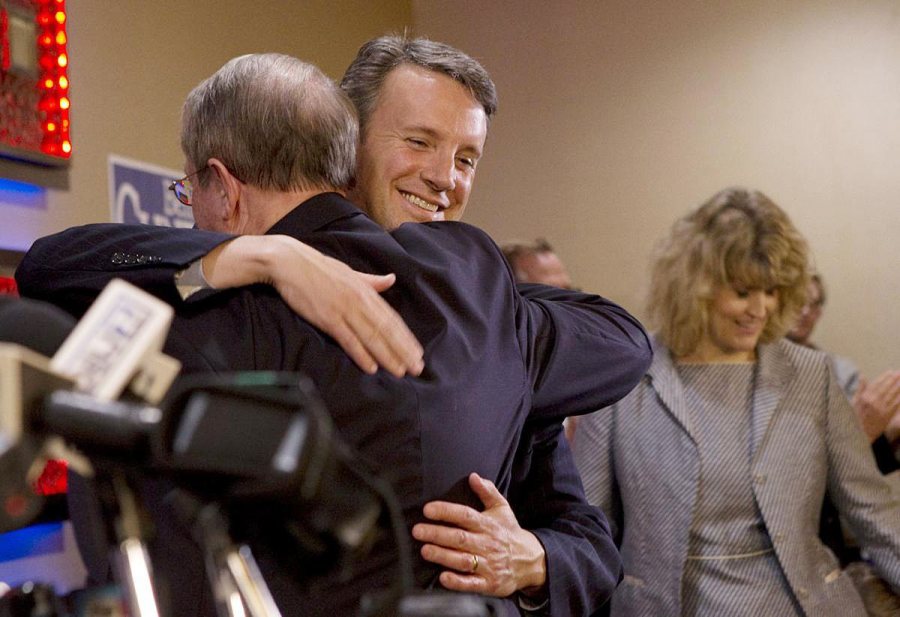
On election night in Virginia, Ben Cline ’94 hugs Bob Goodlatte ’74 before giving his acceptance speech in Roanoke. (Heather Rousseau / copyright The Roanoke Times, reproduced by permission)
Soon after arriving in Washington, Cline drew media attention for a reason he didn’t expect. New members of Congress join a lottery to pick their offices, and Cline got first pick among the 80 new representatives — and was promptly inundated with calls from news outlets asking him about his new office. “Just to show you how the priorities of D.C. are messed up,” he lamented.
“CBS This Morning wanted to follow me around,” Cline said. “I said, ‘Can I go on CBS This Morning? Because I’d like to talk about my priorities for legislation.’ ‘No, we just want to follow you around and see what room you pick.’ That was my moment of fame.”
Cline didn’t go on This Morning, and he said the national media requests have largely subsided. “I’ve been on a very quiet committee assignment of Judiciary ever since,” he joked.
On listening to people
What most people don’t realize, Cline said, is how much of a House member’s attention and resources are devoted to issues back home in the district.
“They see us in Washington, but they don’t see that half of our budget is constituent services, running the offices. Half my staff is in the district helping folks who have problems with Social Security benefits or veterans benefits, solving problems with passports and things like that.”
Golden and Cline or their staffs spend three or four days out of most weeks in the district, hearing their constituents’ opinions.
“I have 19 counties and cities in my district, and so I’m trying to have a town hall in each one of them,” Cline said. “That’s where the rubber meets the road, when people can actually talk to their representative. You’re just being available. That’s what’s going to restore faith in the system.”
A squad leader in the Marines, Golden said that leading a Congressional staff was very different. “I hired good, smart people who challenge me and try and push back and make sure I’m making the right decisions and be thoughtful about it. That’s a learning experience for me, too.”
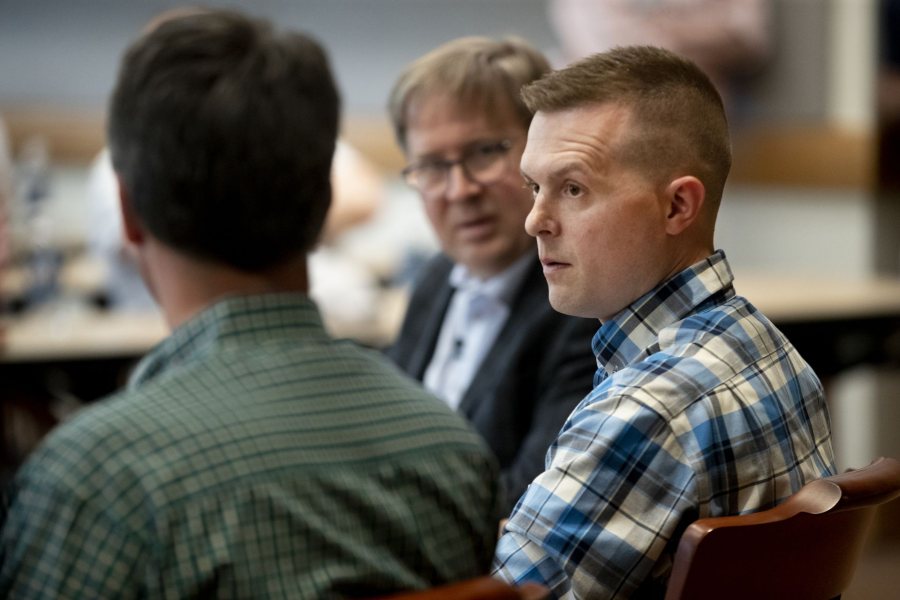
Jared Golden ’11 offers his Maine constituents multiple ways to give him feedback, including taking hikes with him. (Phyllis Graber Jensen/Bates College)
Golden said he might hold a town hall now and again, but finds that the format favors loud and politically extreme views. (Maine’s two U.S. senators, independent Angus King and Republican Susan Collins, also tend to eschew the town hall format.)
Golden also has roundtables and coffee hours, appears at public events, and even tells his constituents to take a hike.
“We say, ‘Come meet us at the head of the trail, and walk through the woods with your Congressman for an hour.’ We’ll get three or four people; but maybe some people need it that low-key.”
On partisanship
Cline, a former member of the Republican-controlled Virginia House of Delegates, had to get used to being in the minority in “one of the most partisan environments imaginable,” he said — and during a shutdown, to boot. “We’re trying, but it’s like starting from 20 yards behind.”
In Virginia, Cline said, it was much easier to work across the aisle.
“In Richmond, all of us sit in the House together on the floor at the same time, and there’s one room in the back called the Members’ Lounge, and that’s where the food is. In line, it’s Democrat, Republican, Democrat, Republican. When we sit down, we’re all sitting together in the back sharing stories.”
On Capitol Hill, Cline has found that there’s a partisan slant to everything from orientation, which is largely separate for Republicans and Democrats, to doorways.
“The caucuses don’t even enter rooms through the same doors. The Republicans go through one door, the Democrats go in another door. Every committee has separate lounges, a lounge for Republicans and a lounge for Democrats.”
“We are starting from a place of stark division and for those of us who want to make changes, the institution’s very resistant to change,” Cline added. “We’ve got a lot of work to do to make it happen.”
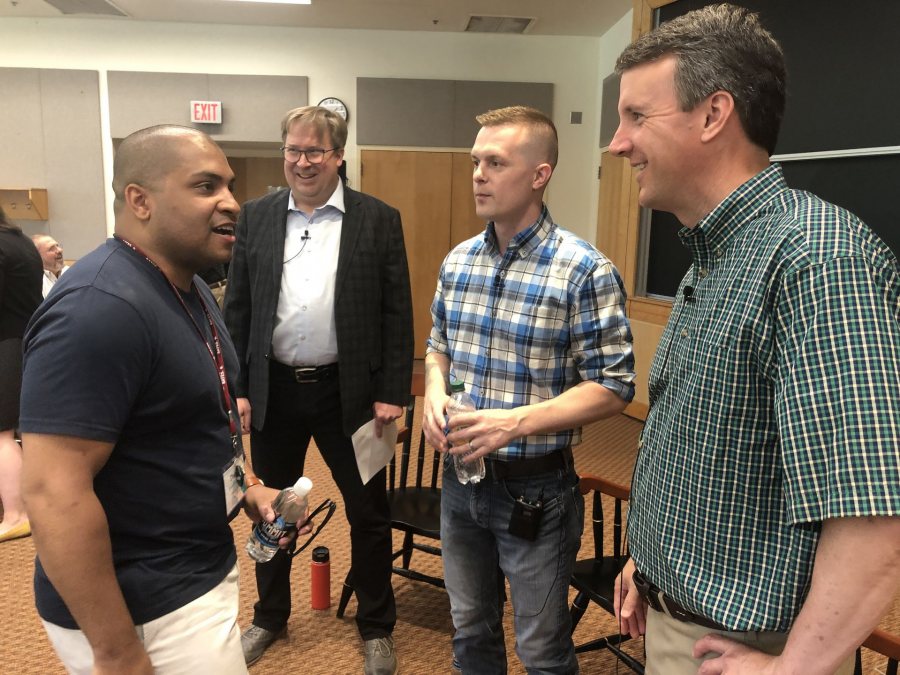
Darnell Morrow ’14 (left) greets Ben Cline ’94 (right) prior to the Reunion discussion on June 8. Both graduates of Washington and Lee Law School, the pair had met once before, when on opposite sides of a legal case. (Jay Burns/Bates College)
Cline said he sometimes plays “Democrat roulette,” saying hello to various Democratic members of Congress and seeing who is responsive and who is not. Golden joined the For Country Caucus, a group of military veterans from both parties who are committed to bipartisanship.
“It’s really a commitment to forge relationships and try and put yourself in the mindset of, what’s the best step for the collective country?” Golden said.
“Forget talking about Middle East peace. Here in our country, we’re in a lot of trouble.”
One audience member in the Keck Classroom called the separate doors “heartbreaking,” and asked the Congressmen if there was any hope for bipartisan cooperation. Neither were optimistic.
Golden recalled listening to a podcast featuring a marriage counselor who also worked on Middle East peace efforts. The counselor said that cooperation is very difficult if people don’t trust either the process of negotiation or negotiators themselves.
“I really thought about our politics these days,” Golden said. “Forget talking about Middle East peace. Here in our country, with our politics, both sides don’t trust one another. The general public doesn’t trust the process. We’re in a lot of trouble.”
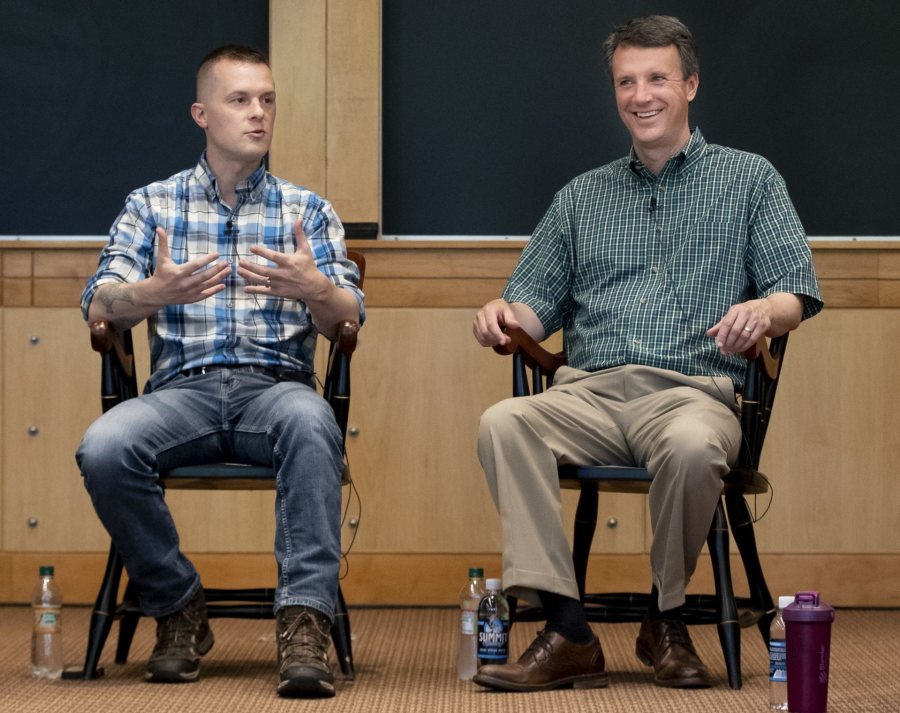
Improving relations between the two major parties in Congress won’t be easy, say Jared Golden ’11 (left) and Ben Cline ’94. “Trying to get a seedling to sprout in that rubble is challenging,” said Cline. (Phyllis Graber Jensen/Bates College)
Cline said the Judiciary Committee, which is conducting some of the highest-profile hearings on the Hill in connection with the Mueller Report, is a microcosm of the hyperpartisanship sweeping Congress. “We were talking past each other and making points and then going back to our offices,” he said.
He said he’s trying to get all the freshman members together for lunch once a week, but the work is frustrating.
“It’s building those relationships from the ground up,” he said. “Right now we just have dust. We just have rubble. Trying to get a seedling to sprout in that rubble is challenging.”
On their Bates experiences
Cline grew up in Lexington, Va., the son of a Washington and Lee economics professor. He had the liberal arts ethos in mind when he arrived at Bates, and he said he got what he wanted.
On a largely liberal campus, the more-conservative Cline was “confronted on day one,” he said. But he learned to debate his beliefs in Commons, where anything and everything was up for grabs.
“Everything was on the table,” he said. “If you had something to say, say it.”
In 1992, Cline’s mother sent him a newspaper clipping — Bob Goodlatte ’74 had won that year’s House seat in his home district. Two years later, Goodlatte returned to campus for his 20th Reunion, and Cline made a point of joining the student BatesStar team for the Class of 1974.
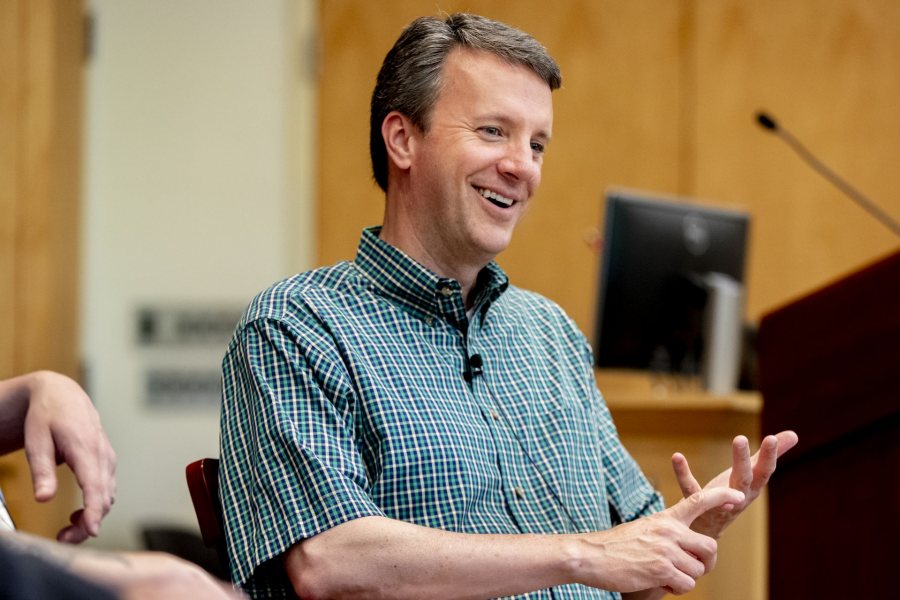
“Everything was on the table” at Bates, said Ben Cline ’94. “If you had something to say, say it.” (Phyllis Graber Jensen/Bates College)
The BatesStars were encouraged to write notes of introduction to the returning alumni. “Mine said, ‘I’m Ben Cline, I’m from Lexington, Virginia, I’m majoring in political science, and I really want to work on Capitol Hill.’”
And during the weekend, he got to meet the new Congressman and his wife, Maryellen Flaherty Goodlatte ’74.
“Sure enough, after he and Maryellen got back to Washington, there was a resume waiting for him. It was at that point that the very first staffer, an entry-level correspondent who wrote the mail, had decided to leave. I got called in for an interview.”
Cline worked for Goodlatte for eight years, becoming chief of staff. After his time in Goodlatte’s office, Cline earned a law degree and served eight terms in the Virginia House of Delegates. When Goodlatte decided to retire in 2018 after 26 years in Congress, Cline won his seat.
“My Bates network was one guy,” Cline said, “but it was a very critical guy.”
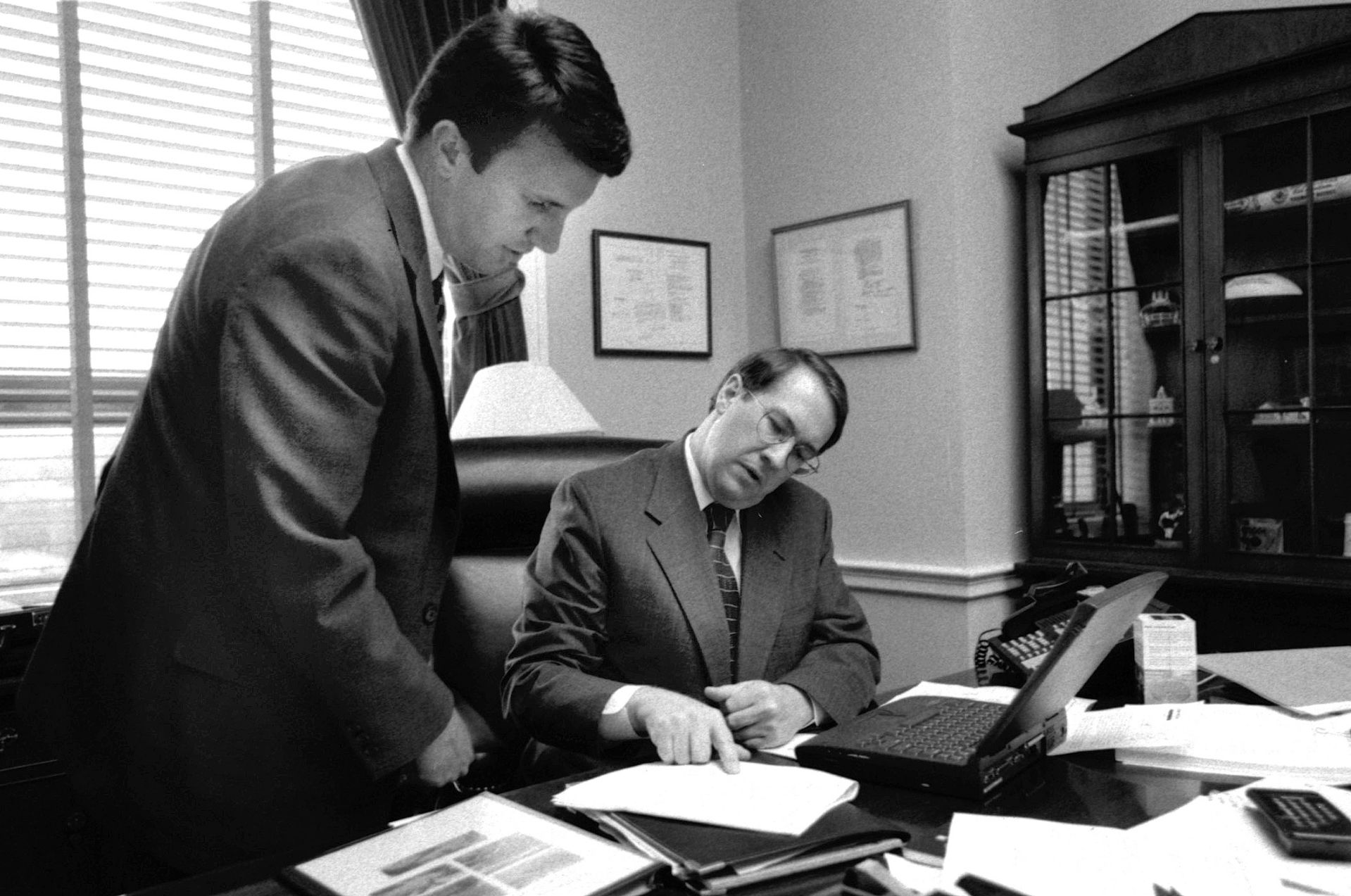
In July 1999, Ben Cline ’94 (left) confers with Rep. Bob Goodlatte ’74 in Goodlatte’s office in the Rayburn House Office Building. Cline was Goodlatte’s legislative director at the time. (Phyllis Graber Jensen/Bates College)
Born in Lewiston and raised in nearby Leeds, Golden served two combat tours in Iraq and Afghanistan before returning to Maine. By the mid-2000s, he was working a few jobs to make ends meet, including one at George’s Pizza in Auburn, a favorite Friday night pizza takeout spot for Bill Hiss ’66, a longtime Bates dean of admission.
The two met one night, and Hiss encouraged Golden, who had briefly attended the University of Maine at Farmington, to return to college, at Bates.
“I’m like, ‘You’re out of your mind, buddy,’” Golden said in recalling Hiss’ suggestion, eliciting a big laugh from the Reunion audience. But, he said, “Bates didn’t laugh.”
“It’s a real lesson that nothing is really impossible. If you want to try something and work hard enough for it, and people will give you a chance and opportunities, you grab onto it, and you can do it.”
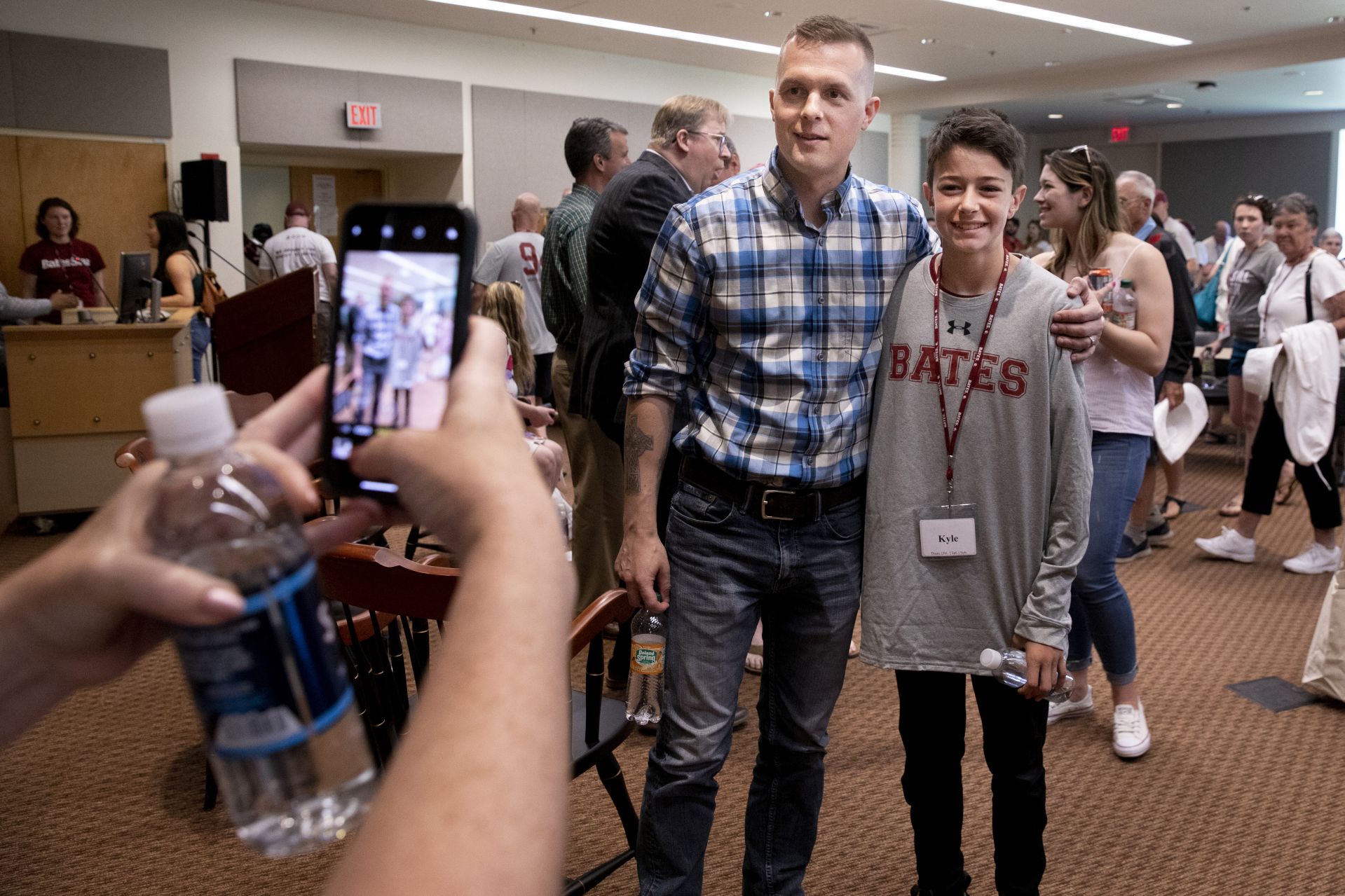
As a parent takes a photo, Jared Golden ’11 poses with a Reunion-goer’s son following the discussion. (Phyllis Graber Jensen/Bates College)
Golden ticked off the ways he was a non-traditional student: He was in his mid-20s and “could also qualify as a townie and the only veteran on campus — so being a little different and facing some resistance in the classroom, but also bringing some,” he said.
After graduation, Golden worked in Collins’ Senate office before returning to Maine in 2013. He served two terms in the Maine House of Representatives and was elected assistant majority leader in his second term. In 2015, he married Isobel Moiles ’11.
In terms of his political perspectives, the lessons he learned as a Marine and as a Bates graduate sometimes intertwine. One result, he said, is being able to see different sides of an issue and a propensity to challenge conventional thinking.
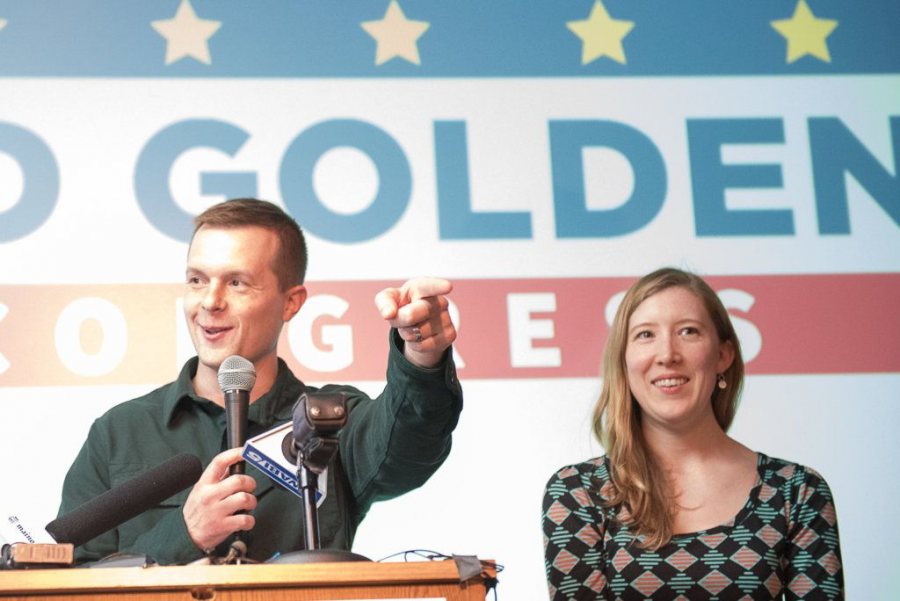
On election night in November, Jared Golden ’11, joined by Isobel Moiles Golden ’11, greet supporters at the Gendron Franco Center in Lewiston. (Russ Dillingham/Sun Journal)
When a Reunion audience member asked whether the U.S. government should intervene in Venezuela, Golden pointed out that Congress didn’t have much power to initiate or stop armed conflict these days. Even so, his experience tended to prevent a yes-no answer.
“It gets real complex, real fast,” he said. “When I talk about my feelings on Afghanistan, I can go, ‘Geez, what are we doing over there? We’re not really helping. We’re wasting so many resources and blood and lives of both countries.’”
But then, “I go and talk to Mustafa.”
As a student, Golden became good friends with Mustafa Basij-Rasikh ’12, a student from Kabul, Afghanistan, who had received support to study in the U.S. from the Peter M. Goodrich Memorial Foundation, founded by Sally and Don Goodrich, whose son Peter ’89 died in the Sept. 11 terrorist attacks.
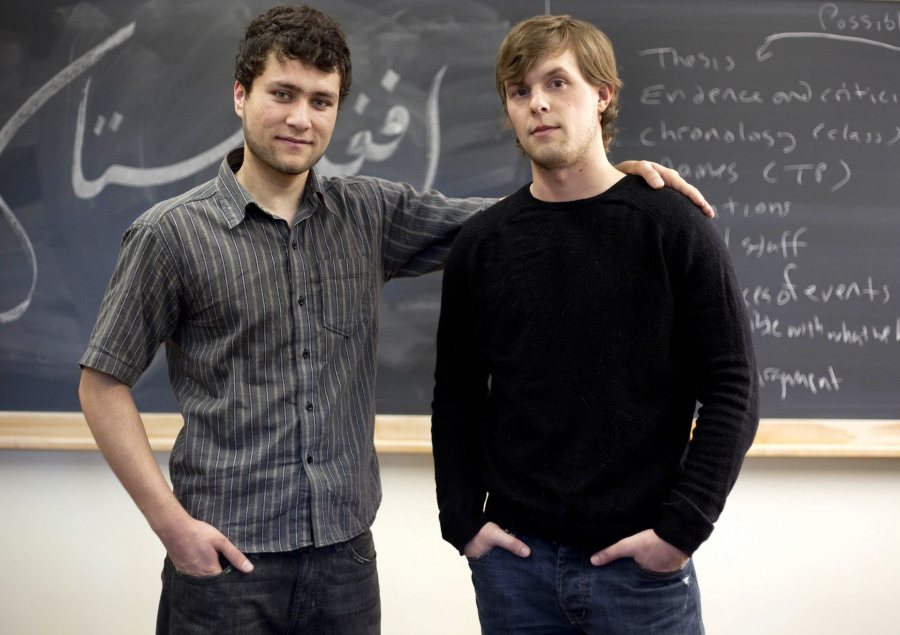
For a 2010 Bates Magazine story, Mustafa Basij-Rasikh ’12 and Jared Golden ’11 posed together in a Pettengill history classroom. (Phyllis Graber Jensen/Bates College)
Golden and Basij-Rasikh both thought deeply about the state of education in Afghanistan, and Golden returned to teach there one summer.
So when Golden thinks about his friend from Kabul, “it gets real hard to say we should just walk away and not engage in that type of [military] activity. A lot of questions, and the answers, are tough to come up with.”
On Capitol Hill, “Bates has put me into a mindset which is probably infuriating at times to some of my colleagues,” Golden told his fellow alumni at Reunion.
“I will challenge conventional thinking as much within my own party and caucus as I would across the aisle in challenging the Republicans.”




